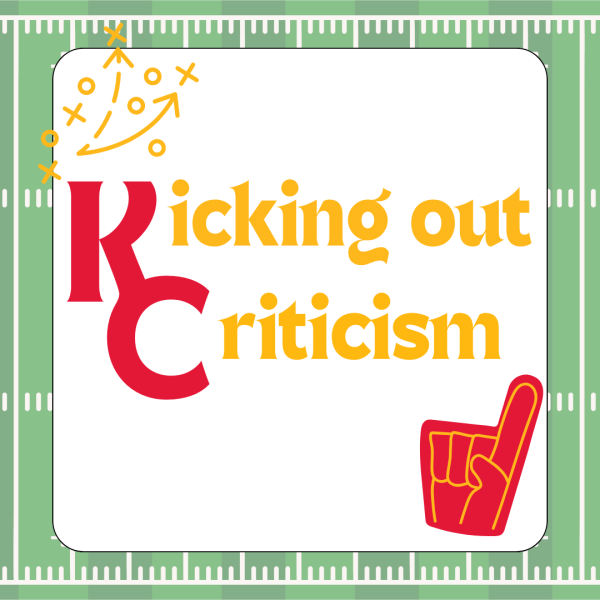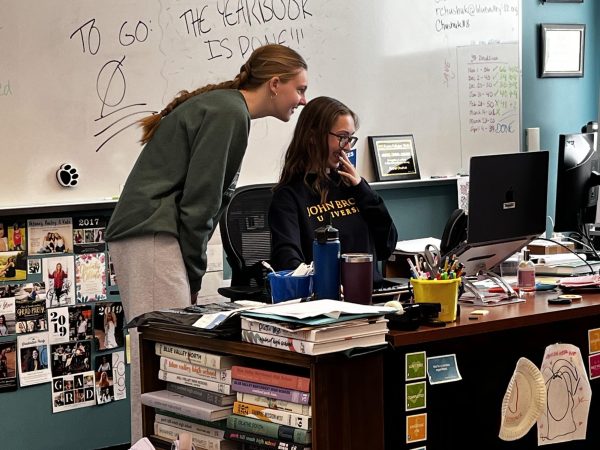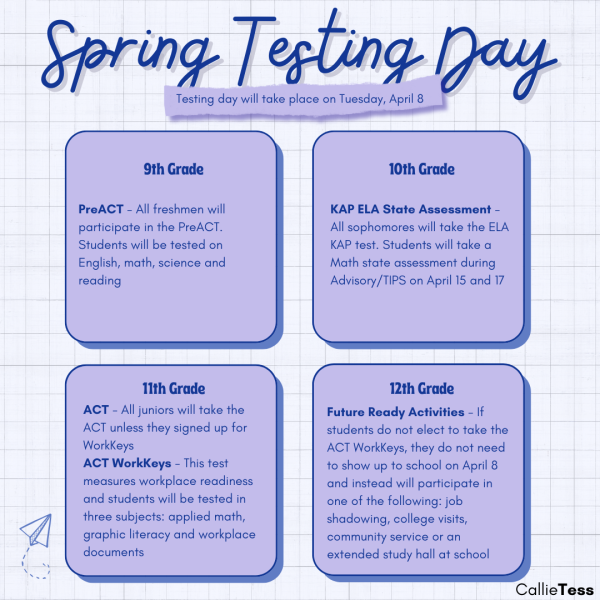The Blue Valley way: District sets unrealistic expectations for students
The Blue Valley way: a term often associated with excellence, success, hard work, integrity, superiority, etc., but is it? According to niche.com — a website with rankings, reviews and statistics on U.S. colleges and K-12 schools — Blue Valley is ranked the number one school district in Kansas, and all five Blue Valley high schools are ranked among the top 10 in Kansas.
Stress is defined by Google as a state of mental or emotional strain or tension resulting from adverse or very demanding circumstances. With emphasis on the origin of stress, Blue Valley’s status creates stress in the lives of its students and faculty. However, the district’s high rank is not to be overlooked. Blue Valley has done an excellent job of upholding their initial goal or mission: to provide unprecedented academic success and unparalleled personal growth for every student. With such a big goal in mind, science teacher Aaron Ballew said he understands the work it takes to get there.
“You kind of have to understand that the goal itself does sound insurmountable, but if you have a well laid out process it’s nothing more than climbing a mountain,” Ballew said. “It’s one step at a time. What can you do today? What can you do tomorrow to make yourself better?”
The problem with setting a high standard is knowing when enough is enough. Sophomore Rachel Kelley said she, too, thinks striving for excellence is admirable, but there is a downfall.
“We are achieving amazing things — like our district is ranked extremely high in the nation — but I also think it comes at a cost as well because, in a sense, it’s not healthy to be pushing yourself and comparing yourself to others,” Kelley said. “I think at some point we need to take a step back and realize we are already ahead of ourselves.”
For the most part, Blue Valley’s successful reputation for constantly excelling can be connected back to the students who work hard to uphold this status. Students put in a great deal of time and deem a lot of their priorities second to school. With this academically-driven mindset, English language arts teacher Meg Miskin said students can work too hard.
“With being highly motivated, I think students put a lot of pressure on themselves to not just succeed, but to highly achieve in everything that they’re involved in,” Miskin said. “I see students who are stretching themselves way too thin or trying to be this perfect person when that’s just impossible for us all.”
This strive for perfection cannot solely be attributed to the district itself; students’ desires to be the best play a role. However, both have contributed to a distorted idea of what success is and what and where you have to reach to succeed.
“That standard is almost categorically ‘if you do not achieve this standard, you are not improving, you are not growing, you are not becoming better,’ where different things might have made you start a little lower —and you’ve grown to a huge amount — but it’s not as acknowledged when you’ve started lower,” Miskin said. “I think there needs to be just a good balance of growth and proficiency, that ‘yes, we have this high standard for students,’ but ‘yes, we need to acknowledge when students leap and grow and achieve far beyond what they were.’”
With a realistic understanding of what success is — merely a desired outcome — junior Joe Ayres said he believes students in Blue Valley have the power to guide themselves.
“I think the students have a lot of control over what they can do and what they feel like they can take on,” Ayres said.
With the opportunity to pave individualistic paths toward different goals, students are generally prompted to respect the education they’re handed and try and build off of it.
“Most of the students are very motivated,” Miskin said. “They’re here to learn and that’s a wonderful, wonderful thing to have as a teacher because I feel like I don’t have to pull teeth so much or sell my lessons to students of why this is important, why this is valuable. Students naturally just have that inclination [that] education is valuable.”
With self-proficient students who want to learn and teachers who are ready with resources to encourage them along, the Blue Valley district has created an atmosphere where their initial goal of unprecedented academic success can flourish.
“I think a lot of Southwest students are extremely hardworking and dedicated,” Kelley said. “I also think that [at] Southwest, overall, we have a sense of community and an overall drive for excellence. I think that every teacher and student wants to be the best and I think that’s something that really puts us ahead.”
A respect for community is fostered at a young age in Blue Valley, realizing that teamwork is a major aspect of success. Community in Blue Valley is not limited strictly to students and faculty, but includes anyone willing to better students for the future.
“We get that ball rolling pretty early and, with help from the parents, it’s a big machine with a lot of moving parts: parents and students and counselors and teachers and administrators,” Ballew said. “As a collective, I think we do a pretty good job of getting kids to the right place.”
There’s no question that Blue Valley provides a platform for students to excel from in the future; however, the problem lies in what skills that platform provides students.
“I think schools, in general now, don’t prepare people for life, don’t prepare you for those soft skills that you need to succeed in life,” Miskin said. “I think that’s something all schools, not just Blue Valley, need to work on.”
A solution to this problem could include embedding life lessons into academic ones. In her classroom setting, Miskin said she emphasizes correction to minimize the strain for perfection.
“What I’m trying to teach my students is success is not this one time goal, and it’s not something that you have to get at the first try,” Miskin said. “True success comes from hard work; it comes from reflection; it comes from failing sometimes and getting better, learning from your mistakes.”
With a district that’s always shifting to try and meet the needs of its students, faculty, community, etc., problems are inevitable. As a whole, there is a need for evaluation and constructive criticism as well as an equally important need for appreciation and understanding.
“I wish that more people would appreciate the benefits that we have here and the advantage we have going to a Blue Valley school, especially this one, because it really is a good thing,” Ayres said. “Sometimes I think people don’t appreciate it for what it’s worth.”
Blue Valley is an incredible district that strives to promote success, hard-work, integrity, competitiveness and, last but not least, excellence. With such an enormous goal in mind, it becomes imperative to emphasize that the goal in and of itself is impossible in order to relieve the ones setting out to achieve it of stress or feelings of inadequacy.
“I love that we have this audacity to try and be better than everyone, which maybe, that may sound a little conceded, that maybe sounds a little arrogant, but it’s our goal,” Ballew said. “Now, we aren’t there, and we’ll never get there, the goal is that. It’s something that you strive for, that you’re constantly trying to climb the ladder for.”












